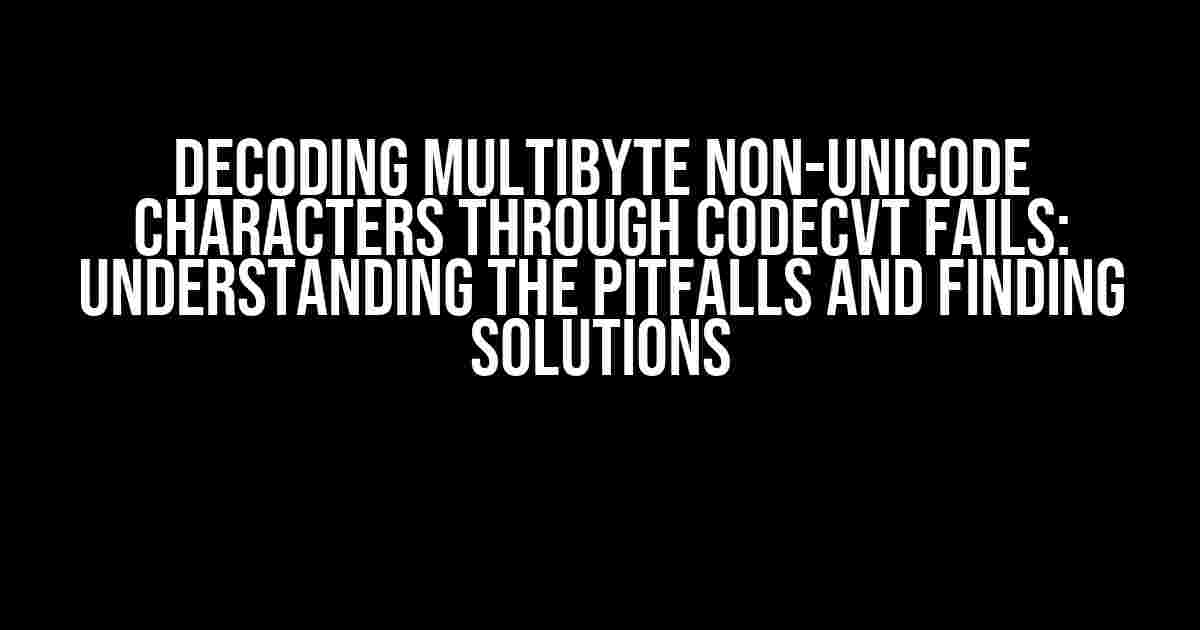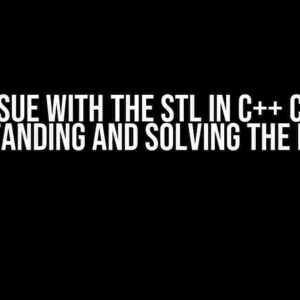When dealing with character encoding and decoding, developers often encounter hurdles, especially when working with multibyte non-Unicode characters. One common obstacle is the failure of the codecvt class in C++ to correctly decode these characters. In this article, we’ll delve into the reasons behind this issue, explore the limitations of codecvt, and provide actionable solutions to overcome these challenges.
The codecvt Class: A Brief Overview
The codecvt class is a part of the C++ Standard Library, introduced in C++98, which provides a way to convert between different character encodings. It serves as a facade for the underlying codecvt_base class, allowing developers to write encoding-specific code using a uniform interface. Despite its usefulness, codecvt has limitations when dealing with multibyte non-Unicode characters.
The Problem: Decoding Multibyte Non-Unicode Characters
When using codecvt to decode multibyte non-Unicode characters, you may encounter issues such as:
- Incorrect character decoding
- Garbled or corrupted output
- Unpredictable behavior
This is because codecvt is designed to work with Unicode characters, which are represented using a fixed number of bytes (usually 2 or 4). Multibyte non-Unicode characters, on the other hand, use a variable number of bytes to represent a single character, making it challenging for codecvt to correctly decode them.
Understanding the Limitations of codecvt
To comprehend the root cause of the issue, let’s examine the design and implementation of codecvt:
codecvt uses a stateless approach to conversion, meaning it processes each character independently. This approach is efficient for Unicode characters but inadequate for multibyte non-Unicode characters, which require context and state to decode correctly.
The codecvt class relies on the do_in() and do_out() functions to perform the actual conversion. These functions are not designed to handle the complexities of multibyte non-Unicode characters, leading to decoding failures.
Why codecvt Fails with Multibyte Non-Unicode Characters
The main reasons codecvt fails with multibyte non-Unicode characters are:
- Lack of context: codecvt does not maintain a conversion state, making it impossible to correctly decode multibyte characters that require context to disambiguate.
- Stateless approach: The stateless design of codecvt prohibits it from handling the variable-length encoding of multibyte non-Unicode characters.
- Inadequate handling of errors: codecvt does not provide robust error handling mechanisms to deal with the complexities of multibyte non-Unicode characters.
Solutions to Overcome the Limitations of codecvt
Now that we’ve identified the limitations of codecvt, let’s explore alternative solutions to decode multibyte non-Unicode characters:
Using ICU (International Components for Unicode)
ICU is a widely-used, open-source library that provides a comprehensive set of APIs for Unicode and character encoding conversion. It offers a more robust and flexible approach to decoding multibyte non-Unicode characters.
#include <unicode/ustring.h>
#include <unicode/ucnv.h>
int main() {
UErrorCode err = U_ZERO_ERROR;
UConverter* cnv = ucnv_open("ISO-2022-JP", &err);
if(U_SUCCESS(err)) {
char input[] = " foo";
UChar output[256];
int outputSize = 256;
ucnv_convert(cnv, output, &outputSize, input, strlen(input), &err);
ucnv_close(cnv);
}
return 0;
}Employing Custom Conversion Functions
In situations where ICU is not an option, you can develop custom conversion functions specifically tailored to your needs. This approach requires a deep understanding of the target encoding and the intricacies of multibyte non-Unicode characters.
#include <string>
#include <vector>
std::string decodeISO2022JP(const std::string& input) {
std::vector<char> output;
output.reserve(input.size() * 2);
for (size_t i = 0; i < input.size(); ++i) {
char c = input[i];
if (c & 0x80) { // Multibyte character
// Handle the complexities of ISO-2022-JP encoding
// ...
} else {
output.push_back(c);
}
}
return std::string(output.begin(), output.end());
}Utilizing Third-Party Libraries
Several third-party libraries, such as iconv and libconv, provide character encoding conversion capabilities that can handle multibyte non-Unicode characters. These libraries can be used as an alternative to codecvt.
| Library | Description |
|---|---|
| iconv | A widely-used, open-source library for character encoding conversion. |
| libconv | A lightweight, open-source library for character encoding conversion. |
Conclusion
In conclusion, decoding multibyte non-Unicode characters through codecvt can fail due to its inherent design limitations. By understanding the root causes of these issues and exploring alternative solutions, developers can overcome these challenges and ensure accurate character encoding conversion. Remember to carefully evaluate the requirements of your project and choose the solution that best fits your needs.
By following the instructions and explanations provided in this article, you’ll be well-equipped to handle the complexities of multibyte non-Unicode characters and ensure that your applications can correctly decode and process these characters.
Frequently Asked Questions
Get the answers to the most pressing questions about decoding multibyte non-Unicode characters through codecvt.
Why does decoding multibyte non-Unicode characters through codecvt fail?
Decoding multibyte non-Unicode characters through codecvt can fail due to the complexity of the encoding schemes used. Codecvt relies on the system’s locale settings, which may not always provide the correct encoding information. Additionally, codecvt may not be able to handle certain edge cases or corner cases in the encoding, leading to decoding failures.
What are the common issues with codecvt when decoding multibyte characters?
Some common issues with codecvt when decoding multibyte characters include incorrect locale settings, incomplete or corrupted encoding information, and inadequate handling of edge cases or corner cases in the encoding. These issues can lead to decoding errors, character corruption, or even program crashes.
How can I improve the accuracy of codecvt when decoding multibyte characters?
To improve the accuracy of codecvt, you can try setting the locale settings to a specific encoding scheme, such as UTF-8 or Shift-JIS, and ensuring that the encoding information is complete and correct. You can also use other encoding libraries or frameworks that provide more robust and flexible encoding and decoding capabilities.
What are some alternatives to codecvt for decoding multibyte characters?
Some alternatives to codecvt for decoding multibyte characters include ICU (International Components for Unicode), iconv, and Boost.Locale. These libraries provide more robust and flexible encoding and decoding capabilities, and are often more accurate and reliable than codecvt.
How can I troubleshoot decoding issues with codecvt?
To troubleshoot decoding issues with codecvt, you can try checking the locale settings, verifying the encoding information, and debugging the decoding process step-by-step. You can also use debugging tools or logging mechanisms to identify the source of the decoding errors and fix them accordingly.


